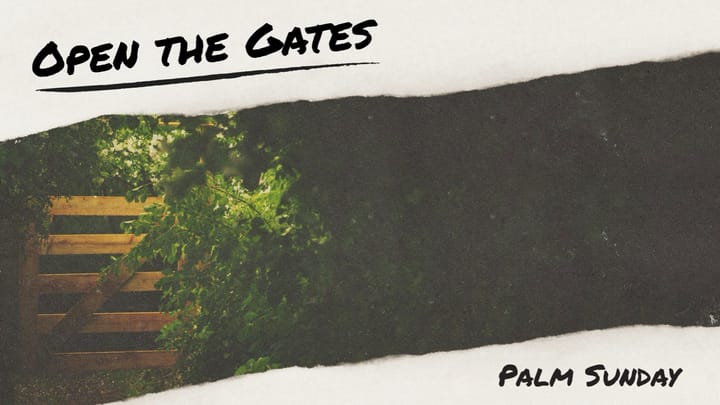Fairhaven Sermon 6-30-2024
The sermon highlights Jesus's compassion and power in healing both the woman with the flow of blood and raising Jairus's daughter from the dead.

In this week's service, Rev. Peg Bowman explores three biblical stories of loss and grief, connecting them to Psalm 130's theme of crying out to God from the depths. She begins with David's lament for Saul and Jonathan, then moves to the New Testament stories of a woman with a chronic illness and Jairus's dying daughter. Rev. Bowman emphasizes how God brings healing and hope in unexpected ways, never abandoning people in their grief but providing strength beyond their own.
The sermon highlights Jesus's compassion and power in healing both the woman with the flow of blood and raising Jairus's daughter from the dead. Rev. Bowman emphasizes that Jesus not only heals physical ailments but also restores people socially and spiritually. She concludes by affirming that even today, God brings life out of death, salvation out of uncleanness, and acceptance out of loneliness. The sermon encourages listeners that with God, there is hope even in the darkest times, and that eternal life begins in the present and continues forever.
Transcript
I honestly had no idea when I picked this coming Tuesday to start our grief group that this Sunday's scriptures would focus on loss and grief. It's one of those things that the lectionary just happened to be right there this week. God has a way of using even these old ancient traditions sometimes, these lectionaries that came from hundreds of years ago, and it fits today. There we are.
So a moment ago we just read the stories of three people who are suffering different kinds of losses. And the first was David, who was not quite king yet, suffering the loss of his best friend in the world, Jonathan, and Jonathan's dad, King Saul. The second is a story about a woman whose name we don't know, who was suffering from a disease that she didn't understand that was slowly killing her. And the third story is about a man whose daughter was very ill and at death's door, and in fact did pass during the story.
During one of life's trials, David wrote Psalm 130, which we read just a moment ago. Out of the depths I cry to you, O Lord. O Lord, hear my voice. And this is a prayer that anyone who is grieving can take hold of and pray for themselves and for their loved ones.
David called this particular psalm a song of a sense. He meant it to be sung as the people of Israel were walking up an 18-mile-long hill to get to the temple and go worship there. It was a tough climb, but there was joy waiting for them when they got there. The joy of God's presence.
So David writes his song from the bottom of the hill to the God who is waiting to welcome all his people at the top of the hill. And each of the three people we meet in scriptures today, all in their own way, were climbing a mountain, not physically, but spiritually and emotionally. So for each one of them, God brings healing in unexpected ways. God never abandons God's people to their grief.
God is always with God's people by our sides in the hardest of times, giving us strength beyond our strength. So let's take a look at how God does this for each of the three people we heard about today. Starting with David. If you've been here the past few weeks, our Old Testament readings have been about the life of David.
Two weeks ago we heard the story of how the prophet Samuel anointed David as a teenager to be the next king of Israel. And then last week we heard the story of David and Goliath, how David defeated the giant with nothing but a slingshot and a stone, which is how he became King Saul's son-in-law, by the way, because King Saul had promised his daughter in marriage to anyone who could kill Goliath. So David went in one day being a young shepherd from the fields, and by the end of that day he was engaged to the king's daughter. And he also very quickly became the best friend of King Saul's son, Jonathan.
So David's feelings of love and loyalty for Saul's family ran very deep. But the relationships weren't always easy, particularly when King Saul started having episodes, for lack of a better word. He would fall into fits of rage and paranoia that sometimes turned deadly. And at one point Saul became convinced that David was trying to take the kingdom from him and nothing David or Jonathan could say would convince him otherwise.
And finally David had to flee for his life. He remained loyal to Saul and to Israel, but he had to live somewhere else. Jonathan helped him escape, and their farewell is one of the most moving stories in the Old Testament. Friendships like that are rare, and they need to be cherished, and to have to walk away from one is just heartbreaking.
So for the next few years David basically led a group of traveling mercenaries around the countryside, helping to keep Israel's farmland safe, and fighting battles now and then to keep the borders secure. And as our reading for this week begins, David and his men are resting in a town called Ziklag after having defeated the Amalekites in a border skirmish. And the reading we heard today focuses on David's lament, but it leaves out an important part of the story, and that is what happened to cause this lament. So here's the back story between the victory at Ziklag to the lament that we just heard.
While David and the men were at Ziklag, a messenger came running from the camp of King Saul, which they had been fighting up further north. And Saul and the Israelites had been fighting the Philistines, and the messenger ran up to David with his clothes torn and dust on his head, which were signs of grieving. And he says, I have escaped from the camp of Israel. And David of course immediately asks, What happened? And he is told, The battle went badly.
Israel's army turned and ran, and the Philistines chased them, killing as many as they could. And King Saul and Jonathan are among the dead. And silently the messenger hands to David what he brought from the battlefield, King Saul's crown and his armband. David tears his clothing and weeps.
In one day he has lost his best friend, his king, and half of his best friend's family. And he begins, and as he begins to process this horrific loss, David picks up his harp and writes a lament for the people he loved. And he sings, Your glory, O Israel, lies slain upon your high places. How the mighty have fallen.
Saul and Jonathan, beloved and lovely, in life and in death, they were not divided. They were swifter than eagles. They were stronger than lions. He goes on a bit for a few more verses there.
But David ordered that this song would be taught to all the people of Judah so that everyone could sing it and grieve together this horrible loss. David never got over this loss. As they talk about getting over things, there is no getting over a loss like this. Later on in life, after he became king, David went searching to see if anyone from Saul's family was still alive.
And he discovered that Jonathan, his best friend, had a son who was still living, who was not at the battle that day because his feet were deformed and his caregiver got him away to safety. And so King David brought Jonathan's son to live with him in the palace for the rest of his life out of love for his friend. And so the people of Israel sang, Out of the depths I cry to you, O Lord. O Lord, hear our voices.
And then we come to the New Testament, where you basically have two stories in one. And there's a common thread between the two stories. It's not something that's actually spoken in the scriptures, but people back then would have just known and understood this. It has to do with the law of Moses.
Moses had taught the people that some things in life make a person, as they put it back then, ceremonially unclean. That is, that a person would not be permitted to go into the temple or to worship until they had either rested or healed or bathed or whatever needed to be done. And in these stories, both the woman and the child have become ceremonially unclean. And an important part of this story is watching how Jesus deals with this.
So the story begins with Jairus, leader of the local synagogue. And he comes to Jesus one day and he is beside himself, desperate, crying out over and over again, Please come to my house. My daughter is dying. Please come.
Lay your hands on her and heal her so that she will live. Love of this father for his daughter is so deep. So it's worth pointing out that not every religious leader in Israel back then thought that Jesus was wrong. Jesus did have run-ins with the Sadducees and the Pharisees and the priests, but not all of them.
So this particular synagogue leader understood what Jesus was saying and he stood with Jesus. But it's also interesting that Jairus thought that Jesus had to physically come and touch his daughter because a short time before this, a Roman centurion had asked Jesus to heal his servant. And when Jesus said he would come, the centurion said, Don't trouble yourself. All you need to do is say the word because like you, I'm a man under orders who has people under me and I tell this one go and he goes and I tell this one come and he comes and I say to my servant, 'Do this,' and he does it.
And Jesus answered, Even in Israel, I have not found faith like this. Let it be done as you believed it would. And in that moment, his servant was healed. But Jairus needed a physical touch and Jesus was okay with that too.
God understands our needs and meets us where we are. So Jesus starts to walk towards Jairus' house. And while they're on their way, with the disciples and a huge crowd following, unnoticed by anyone, a woman slips up behind Jesus and touches his robe. And she does this because she's been suffering from a flow of blood for 12 years.
And the minute she touches Jesus' robe, she's healed. She does this on the sly because she knows she's disobeying the law of Moses. The law says that anyone with a flow of blood is unclean and anyone who touches her is unclean. But this woman is desperate and so it looks like she's gotten away with it until Jesus turns around and says, Who touched me? And a crowd full of people, he knew and she's been caught.
And she comes forward trembling and tells Jesus the whole story. Basically, she has been experiencing a 12-year long period. She has been to every doctor and spent all her money trying to get well, but nothing has worked and the constant loss of blood has worn her body out. And on top of that, she's a social outcast because she's considered unclean.
I want to share with you, I actually have had this condition once a long, long time ago. It's a scary thing and I only had it for a month before I ran running to the doctor. For us here in the 21st century, it's an easy fix. One month of birth control pills and you're good.
It rebalances the hormones and you're fine. But the woman back then in Jesus' time did not have that option. Back then, what she had was a slow and certain death from loss of blood. Our Lord Jesus, when he heals, he doesn't just heal the body, he heals the heart as well.
Jesus was not angry with her for breaking the rules. In fact, he praises her boldness, her daring to defy what really was an unfair law. And he calls her daughter, putting her on the same level of innocence as Jairus' 12-year-old. He says, Your faith has made you well.
Go in peace and be healed. It's interesting that in Greek, the word healed is the same word as saved. So this woman is healed, she's going to live, but more than that, she's no longer an outcast. She is right with God and is once again welcomed by people.
So her story has a happy ending, except for one thing. As Jesus was still speaking with her, some of Jairus' friends arrive from his house and they say, Don't trouble the teacher any longer. Your little girl is dead. The words cut through Jairus' heart like a knife.
Did this woman's delaying Jesus cost his daughter his life? I'm sure that thought crossed his mind. But Jesus overhears the message and turns to Jairus and says, Don't be afraid. Just believe. And he takes Peter and James and John, the same three disciples who were on the mountain of transfiguration, and they go to Jairus' house.
And when they get there, the mourners have already arrived and they're grieving loudly. But Jesus says, The girl is only sleeping, and puts the mourners out of the house. Now why would Jesus say this? Because they certainly, these people were intelligent enough to know what dead was. They certainly knew otherwise.
But Jesus is actually about to break the same law that that woman broke. He's about to touch an unclean body, because back then, dead bodies were also unclean. What the people didn't understand and would not understand until after Jesus' resurrection is that nothing on earth has the power to make Jesus unclean. In fact, just the opposite.
Jesus has the power of cleanness and of health and of life. And when Jesus walks in, sickness is over and death is dead. So the mom and the dad and the disciples and Jesus go into where the girl is lying, and Jesus takes her hand and says, Little girl, get up. And she does.
I mean, imagine her parents. Imagine their face out of the depths, out of the depths. They hear Jesus saying, Get her something to eat. David wrote in his psalm, O Israel, hope in the Lord.
For with the Lord there is steadfast love, and with him is great power to redeem. The woman who was healed is no longer sick, is no longer alone, is no longer unclean. She has been seen and encouraged and healed. And Jairus and his wife are no longer alone.
Their grief is gone and their daughter is back. For us today, Jesus is with us also. We are not alone. Even today, as impossible as it may seem sometimes, God still brings life out of death, salvation out of uncleanness, acceptance out of loneliness.
Because Jesus went through death himself and overcame it, that great adversary has been defeated. In God and with God, we have hope even in the darkest of times. In God and with God, faith brings the outcast home and dead people to life. In God and with God, the difference between life here and now and eternal life becomes a false dichotomy because in God and with God, eternal life begins now today and goes on forever.
And so with David we sing, I wait for the Lord, my soul waits. And in his words I hope, my soul waits for the Lord more than watchman for the morning. God's eternal sunrise is coming soon and the dawn is already breaking. Amen.


